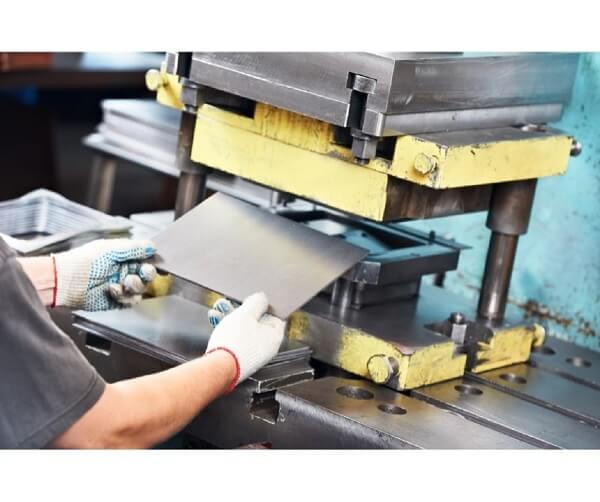Advanced Techniques in Metal Stamping for Accuracy Production
In the realm of precision production, the evolution of metal marking techniques has actually been an essential pressure in achieving unequaled degrees of precision and efficiency. As industries constantly demand better resistances and intricate styles in their metal components, the quest for innovative strategies in steel marking has magnified. From the usage of sophisticated multi-stage stamping processes to the assimilation of advanced automation modern technologies, the landscape of steel marking is undergoing a profound improvement. In this dynamic arena, the merging of innovation and precision is reshaping the possibilities of what can be accomplished in metal fabrication.
Advanced Multi-Stage Stamping Processes
Reviewing the ins and outs of innovative multi-stage marking processes reveals the sophisticated methods utilized in modern-day manufacturing techniques. Metal Stamping. Multi-stage marking is a complex procedure that includes multiple steps to transform a level sheet of steel right into a last stamped product. Making use of dynamic dies, where various procedures are done at each phase of the marking process, permits high accuracy and performance in the production of intricate steel parts
Throughout the preliminary phases of multi-stage marking, the level steel sheet is fed into the stamping press, where a series of passes away are utilized to cut and shape the product. Subsequent stages include added forming, flexing, and punching operations to more refine the component. Each phase is carefully designed to build on the previous one, leading to the creation of complicated geometries with tight tolerances.
Advanced multi-stage marking processes call for a high level of expertise and precision to ensure the quality and uniformity of the stamped components. By utilizing innovative equipment and tooling, suppliers can produce a vast array of steel elements with performance and precision.
Accuracy Tooling Innovations
Precision tooling advancements have changed the metal marking sector, enhancing performance and top quality in manufacturing procedures. CNC systems allow for complex designs to be converted directly right into tooling, making sure accuracy and repeatability in the marking process.
In addition, the integration of sensing units and real-time monitoring abilities in precision tooling has actually enabled suppliers to find and resolve issues without delay, lessening downtime and decreasing scrap prices. By integrating clever modern technology into tooling, drivers can optimize specifications such as stress, rate, and alignment during the marking procedure, causing boosted product high quality and increased productivity.

Automation in Steel Stamping
The evolution of precision tooling developments in the metal stamping market has led the method for significant developments in automation, changing the production landscape towards enhanced efficiency and efficiency. Metal Stamping. Automation in steel marking entails using innovative machinery and robotics to perform different tasks traditionally performed by human drivers. This shift towards automation offers many advantages, including improved accuracy, much faster manufacturing cycles, and decreased labor costs
One secret facet of automation in metal marking is the implementation of computer system numerical control (CNC) systems, which make it possible for precise control over the marking process. CNC technology enables the creation of facility and complex metal parts with consistent high quality. Furthermore, automated systems can be programmed to run continuously, bring about greater result prices and much shorter preparations.
In addition, automation improves workplace security by minimizing hands-on handling of hefty materials and decreasing the risk of crashes (Metal Stamping). As manufacturing markets continue to welcome automation, the future of steel stamping holds fantastic assurance for even greater effectiveness and innovation
High-Speed Stamping Techniques

One of the main benefits of high-speed marking strategies is the capacity to create a big volume of components in a shorter quantity of time contrasted to conventional marking techniques. This raised efficiency not only allows makers to meet limited manufacturing due dates but likewise allows cost savings with economies of range. Additionally, high-speed marking can help in reducing material waste by optimizing the product usage during the marking process.
Furthermore, high-speed stamping strategies usually include ingenious functions such as quick die adjustment systems and real-time surveillance abilities, better improving the general effectiveness and versatility of the metal stamping procedure. As innovation proceeds to development, high-speed marking is expected to play a critical function in driving the future of precision production.
Quality Assurance in Stamping Procedures
Effective quality assurance steps are crucial for making certain the reliability and consistency of metal marking operations. Quality assurance in stamping procedures involves a series of organized procedures focused on finding and preventing flaws in the produced parts. One essential facet of quality assurance in steel Learn More Here stamping is the use of innovative inspection methods such as optical evaluation systems and coordinate measuring devices (CMMs) to confirm the dimensions and resistances of stamped components.
In addition, quality assurance actions in marking procedures usually consist of the application of statistical procedure control (SPC) methods to keep track of the production procedure in real-time and ensure that it stays within appropriate restrictions. By evaluating information and identifying fads, makers can proactively address any type of inconsistencies from the wanted high quality standards.
In addition, quality assurance in steel stamping procedures also entails comprehensive material testing to guarantee that the raw materials made use of meet the called for important link specifications for the stamping procedure. This might include conducting product hardness tests, tensile toughness tests, and dimensional assessments to guarantee the quality and integrity of the stamped components. On the whole, executing durable top quality control measures is essential for achieving premium stamped components consistently.
Verdict
Finally, advanced methods in steel marking play an important role in accuracy production processes. Via multi-stage stamping procedures, innovative tooling options, automation, high-speed methods, and rigorous quality control measures, manufacturers can attain greater levels of accuracy and performance in their procedures. These improvements in metal stamping technology have actually allowed business to produce intricate components with tight tolerances, inevitably bring about boosted product quality and consumer contentment in the production sector.
Comments on “Elevate Your Manufacturing Quality with State-of-the-Art Metal Stamping Providers”